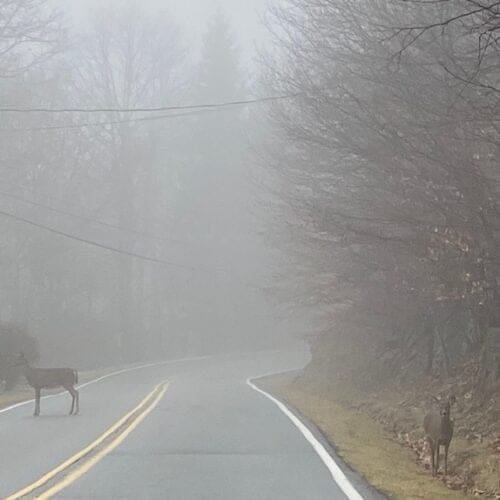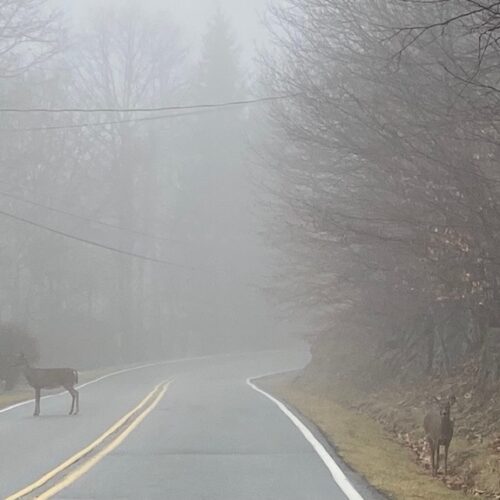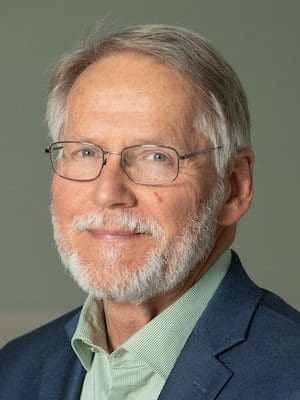
Spending a post-semester week near Boone, North Carolina, brought back memories of the four good years I lived there in the 1980s. I served as pastor to the good people of Oak Grove Baptist Church and did a little adjunct teaching at Appalachian State University while completing my Ph.D. dissertation and learning to ski well enough to need a future hip replacement.
(Photo: Susan Cartledge)
Boone is at an elevation of 3,300 feet, surrounded by higher ground and occasionally cloaked in clouds, which can hang heavy over the mountaintops for days and render visibility to little more than 20 yards ahead.
As Susan and I drove into Deep Gap, we were engulfed in one of those cloudy spells, and caught only glimpses of the sun for the next four days. Driving was occasionally hair-raising, especially on narrow roads with frequent switchbacks and sharp drop-offs.
But drive we did, because sketchy roads can lead to the best trails, and we were determined to hike as often as we could (okay, and to visit wineries and craft shops when we couldn’t).

(Photo: Susan Cartledge)
Walking in the clouds carries with it a certain charm. You can’t see much from the occasional overlooks, but you pay closer attention to the trail, treading carefully around the muddy spots and onto stepping-stones placed strategically to navigate creek crossings.
Leaves were long gone, but tree trunks have their own character, strong and healthy or old and broken, a host for mushrooms. We marked where bears had clawed into the soft wood in search of grubs, and admired forest hummocks sleeping beneath blankets of verdant moss.
Clouds do little to muffle the sound of rushing or falling water, and we admired one cascade after another. Along the edges, where the vapor rises, spiderwebs hung in broken but beautiful tangles, coated with a filigree of ice (did I mention it was also cold?).

(Photo: Susan Cartledge)
I love hanging out in the clouds but doing so can be a hazard. The danger of navigating winding roads through a thick, gray mist is self-evident, but you can guess that I’m heading toward the land of metaphor.
More than once, as a boy, parents or teachers warned me to get my head out of the clouds and focus on more practical tasks. I couldn’t help it if I found space travel more interesting than geography, or a good novel more appealing than chopping weeds out of the butterbeans.
I still like cloud thinking. I like to dream of traveling to exotic places, or uncovering an ancient stele bearing an early alphabetic inscription, or writing a novel that sets the literary world abuzz.
But fantasizing doesn’t get students educated, Bible studies written, or other work done.
I also love to imagine a world where people respect not only national borders, but all nationalities; a society in which racism is a thing recalled rather than practiced; a country in which people don’t need a personal arsenal to shore up their insecurities.
Wishful thinking can be an uplifting exercise, but at the end of the day, we know that we need to come down from the clouds, like airplanes descending through overcast skies, and land in the world of reality.
If we want the real world to be more like our imagined world, we’ve got work to do.
Back in the mid-60s, as overt racism and misguided wars had the country in turmoil, a young college student named Phil Ochs gave up his journalism studies to write and perform music protesting the unhappy state of society.
Ochs was known more for the power of his lyrics than the quality of his guitar playing, but his zeal for action was clear. A particularly memorable song combined a haunting tune with an eight-verse call to action. Consider some of the lyrics:
There’s no place in this world where I’ll belong when I’m gone,
And I can’t show the right from the wrong, when I’m gone,
And you won’t find me singing on this song when I’m gone,
So I guess I’ll have to do it while I’m here.
And I won’t breathe the bracing air when I’m gone,
And I can’t even worry ‘bout my cares when I’m gone,
Won’t be asked to do my share when I’m gone,
So I guess I’ll have to do it while I’m here.
Won’t see the golden of the sun when I’m gone,
And the evenings and the mornings will be one, when I’m gone,
Can’t be singing louder than the guns when I’m gone,
So I guess I’ll have to do it while I’m here.
And I won’t be laughing at the lies when I’m gone,
And I can’t question how or what or why when I’m gone,
Can’t live proud enough to die when I’m gone,
So I guess I’ll have to do it while I’m here.
The tragedy is that, despite the power of his music and the depth of his commitment to the peace movement, Ochs also struggled with mental illness and alcoholism. Ultimately, he surrendered to despair and committed suicide.
Followers of Jesus have a calling to make our world a better place, and a hope to persist even when our efforts fall short, when the ugliness of fear and hatred and deceit appears to prevail.
We all have work to do, and I guess we’d better do it while we’re here.
Author’s note: Lyrics above from “When I’m Gone,” Phil Ochs in Concert, Elektra Records, 1966. Hear Ochs’ rendition of the song here.
Professor of Old Testament at Campbell University Divinity School in Buies Creek, North Carolina, and the Contributing Editor and Curriculum Writer at Good Faith Media.


